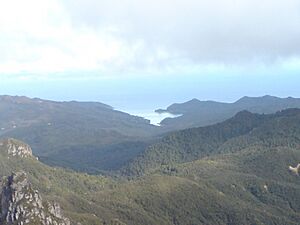Whangaparapara facts for kids

Whangaparapara is a beautiful harbour and small community. You can find it on Great Barrier Island in New Zealand's Hauraki Gulf. Long ago, people from Europe came here for mining, cutting down trees, and whaling. Today, Whangaparapara is a popular place for tourists and boaters. Boats can even get fuel and water here.
Contents
Whangaparapara's Past
Whangaparapara has a rich history. Many years ago, it was a busy place with different industries.
Timber and Trees
When European settlers arrived, they cut down many native trees. They built special tracks called tramlines to move the timber. These logs were taken to the harbour and then shipped to Auckland for processing. Today, parts of these old tramlines are a fun walking path. It's a great way to explore the area's history.
Gold and Silver Mining
In the late 1800s, people found gold and silver in Whangaparapara. This led to mining activities. You can still see parts of an old machine called the Oreville stamping battery. This machine was used to crush rocks to get the precious metals out. It's a cool reminder of the mining days.
The Kauri Timber Company
In the early 1900s, a huge sawmill was built here. It was run by the Kauri Timber Company. This mill processed logs from other parts of New Zealand, like the Coromandel Peninsula and Northland Region. For a while, it was one of the biggest sawmills in the southern half of the world!
New Zealand's Last Whaling Station
From 1957 to 1962, New Zealand's very last whaling station operated in Whangaparapara Harbour. This station was located on the northern side of the harbour. You can still see its remains today.
The SS Wiltshire Anchor
In 1922, a ship called the SS Wiltshire was wrecked near Whangaparapara. Its anchor is still visible at a local lodge. It's another interesting piece of history from the area.
Protecting the Kauri Trees
In the 2010s, the Department of Conservation had to close a walking track. This was the Mount Whangaparapara track. It was closed to help protect the native kauri trees from a serious disease called Kauri dieback. This disease can harm and even kill kauri trees.
 | Calvin Brent |
 | Walter T. Bailey |
 | Martha Cassell Thompson |
 | Alberta Jeannette Cassell |

